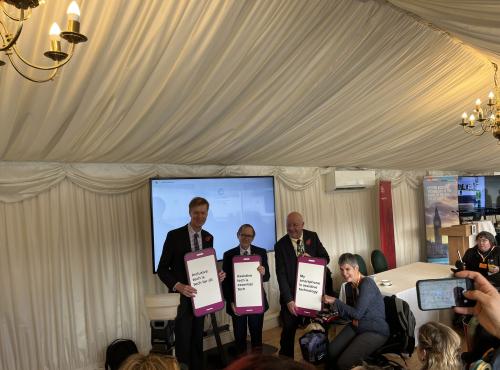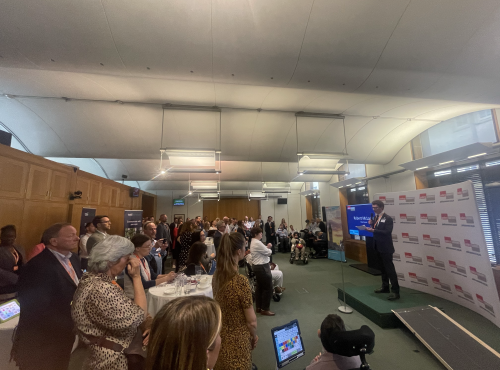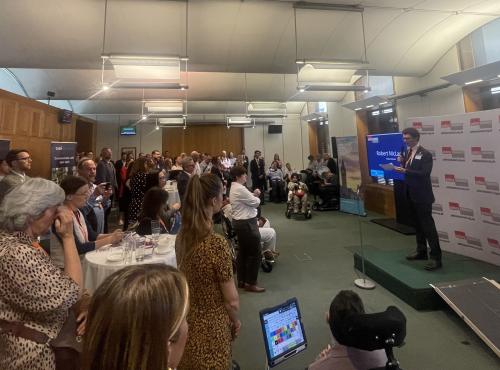Connect to Success: Technology and Employment Support for Disabled People
The Government should improve employment opportunities for disabled jobseekers by taking advantage of modern assistive and accessible technology.
Cross-party think tank Policy Connect and the All-Party Parliamentary Group for Assistive and Accessible Technology’s latest report, ‘Connect to Success: Technology and Employment Support for Disabled People’, examines the contribution of employment support services for disabled job seekers, and shows how these services can become more effective by providing support for their clients to use assistive and accessible technology (ATech) to overcome barriers to employment.
Rates of economic inactivity have proved persistently higher among disabled and neurodivergent people, with only 54.4% of working age disabled people in employment compared to 81.9% of non-disabled people. The situation is particularly acute for people with learning disabilities, with employment rates that are estimated to be between 4.8% and 26.7%.
The Get Britain Working White Paper has outlined the new Government’s plans to increase economic activity, with a long-term target of an 80% employment rate and 2.1 million more people in work. This can only be achieved if more disabled people are able to find and thrive in employment.
The report argues that government’s employment support reforms – including the creation of the ‘Connect to Work’ scheme that will support an estimated 100,000 disabled people over 2026-27 – offer a once-in-a generation opportunity to incorporate ATech into the design of these new and reformed services.
ATech is already a valued and common form of workplace adjustment, and as Connect to Success outlines, employment support services will prove most effective at breaking down barriers to work if they build access to ATech into their programmes for developing disabled clients’ employability skills and confidence.
Connect to Success sets out three recommendations for the Government to improve access to employment for disabled jobseekers by incorporating ATech into employment services:
- ATech should be part of the everyday delivery of the new jobs and careers service and be incorporated into local Get Britain Working Plans, including local Connect to Work schemes. Employment support clients should be helped to explore what ATech is right for them and begin using the technology, gaining skills and confidence with it, even before they secure paid work.
- Government should partner with the tech and disability sectors to establish a national Centre for ATech, whose role would include (i) providing strategic guidance to employment support service leaders and (ii) upskilling frontline professionals.
- Special Educational Needs and Disabilities (SEND) and post-16 essential skills provision should recognise ATech as a core employability and life skill for disabled people. ATech should be incorporated in all relevant standards and frameworks related to preparation for adulthood (PfA) SEND provision, and within any proposed National Standards for Personal, Social and Employability Qualifications.
“Connect to Success is a vital and timely contribution to ongoing discussions about employment and the need to ensure more people can enter and thrive in work. The report convincingly outlines the case for reforming employment support services with greater incorporation of technology to break down persistent barriers to employment for disabled people. Assistive and accessible technology (ATech) is already a valued and common form of workplace adjustment, and I hope very much the Government will seize the opportunity of its new Connect to Work scheme to expand access to this technology. By reducing barriers to accessing ATech and developing skills and confidence in its use, employment support services will be better placed to help their disabled clients secure paid work and build successful careers. It’s fantastic that Sir Stephen has made time during the Parliamentary Recess to address this launch event, and I look forward to working with colleagues in Parliament and the wider sector to help ensure ATech becomes an integral part of employment support delivery.” – Lord Shinkwin, All-Party Parliamentary Group for Assistive and Accessible Technology (APPGAT).
Notes to editors
This report was kindly sponsored by the Ian Karten Charitable Trust.
This is not an official publication of the House of Commons or the House of Lords. It has not been approved by either House or its committees. All-Party Parliamentary Groups are informal groups of Members of both Houses with a common interest in particular issues. The views expressed in this report are those of the group.
About Policy Connect
Policy Connect is a cross-party think tank. We specialise in supporting parliamentary groups, forums and commissions, delivering impactful policy research and event programmes and bringing together parliamentarians and government in collaboration with academia, business and civil society to help shape public policy in Westminster and Whitehall, so as to improve people’s lives. Our work focusses on five key policy areas which are: Education & Skills; Industry, Technology & Innovation; Sustainability; Health; and Accessibility. We provide the secretariat for the All-Party Parliamentary Group for Assistive and Accessible Technology (APPGAT).
We are a social enterprise and are funded by a combination of regular annual membership subscriptions and time-limited sponsorships. We are proud to be a Disability Confident and London Living Wage employer, and a member of Social Enterprise UK.
About the APPG for Assistive and Accessible Technology
The APPGAT aims to disseminate knowledge, generate debate and facilitate engagement on assistive technology amongst Members of both Houses of Parliament. The group is chaired by Josh Fenton-Glynn MP (Labour), with parliamentary Officers Lord Shinkwin (Conservative), Sadik Al-Hassan MP (Labour), and Lord Low (Crossbench), and Members including Steve Darling MP (Lib Dem), Rt Hon. Lord Blunkett (Labour), and Baroness Tanni Grey-Thompson (Crossbench).
About The Ian Karten Charitable Trust
The Trust is named for its founder, Ian Karten MBE (1920-2011), who escaped Nazi occupied Europe, served in the Royal Air Force, and went on to establish a successful technology company. The Trust funds a number of initiatives related to education and inclusion, among which is its support for the charity The Karten Network, that runs over 100 technology centres for disabled people in the UK and Israel.



